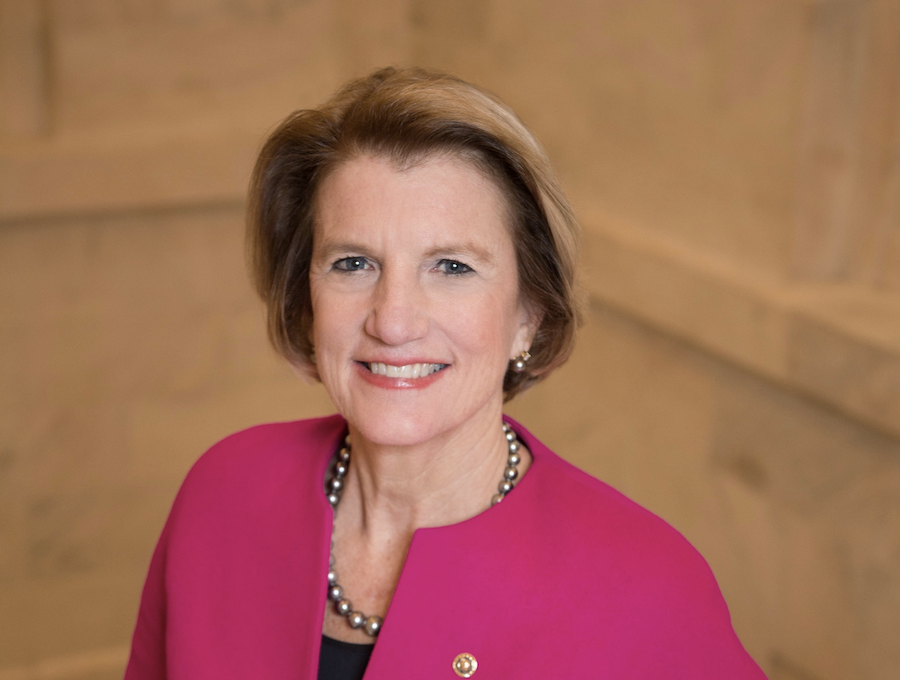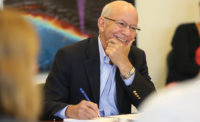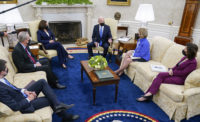Infrastructure legislation talks in Congress are proceeding on two fronts: between the White House and Senate Republicans on a wide-ranging multi-sector package and between Senate Democrats and Republicans on a narrower—but still substantial—bill to reauthorize the federal highway program, lawmakers and administration officials say.
Key negotiators provided a status report on both sets of discussions at the Transportation Construction Coalition’s annual legislative "fly-in,” held virtually on May 20.
For the broader infrastructure talks, administration officials and Senate Republicans seek to bridge a dauntingly large divide between President Joe Biden's $2.2-trillion American Jobs Plan and the Senate GOP's $568-billion initial counteroffer.
"We're far apart," says Sen. Shelley Moore Capito (R-W.Va.), who leads the Senate GOP negotiating team. She does see some "common ground" between the two, noting that both sides include funding for eight categories of "physical core" infrastructure. Among those are highways/bridges, transit, drinking water and wastewater treatment, airports and broadband.
At the latest meeting, held May 18 in Capito's office, she says, “We put forward a more robust proposal and also an idea of where we are.”
She says the critical topic of how to finance the eventual package also came up. "We did get into 'pay-fors' a little bit." Capito adds, "but I think really the policy needs to drive the numbers."
For financing options, Republicans are mulling such things as user fees and drawing on some of the unspent funds from earlier COVID-19-related measures. On that point, she suggests looking at funding unused by the more than 20 states that are not providing enhanced unemployment benefits that could go for infrastructure and "job creation."
But she also says the structure of the new offer was similar to the initial one. “To be honest with you, we pretty much stuck to what we think is the physical framework of our plan," Capito says.
The next step is a reaction from the administration team that could come as early as May 21, Capito indicates.
“We’re hopeful,” says Transportation Secretary Pete Buttigieg, also involved in the negotiations. “We’re having conversations literally every day. The President is committed to doing everything we can to find common ground ... so the conversations will continue."
He acknowledges,”We’re certainly starting from very different points of view," but adds that the administration welcomes that the Republicans' offer and the discussions "have gotten pretty concrete—no pun intended.”
Buttigieg also says, “I think that we are going to have to get to results in relatively short order," adding that he’s “hopeful these conversations will produce something that we can agree on across party lines."
Senate Highway Bill Status
For the Senate highway measure, Sen. Tom Carper (D-Del.), who chairs the Environment and Public Works Committee, has set a May 26 target for his panel to vote on a legislative proposal. His goal is a bill that will extend for five years. “The overall package is going to be a little bit north of $300 billion,” he says.
That compares with a $287-billion highway measure the committee unanimously approved in 2019, when the Senate was controlled by Republicans, but it never reached the floor.
Carper says the new measure shaping up will address climate change, but he hopes it will be “stronger” than the previous one included in the 2019 bill.
As top committee Republican, Capito is also her party's main negotiator on the highway legislation. “We’re very close to reaching an agreement on a [highway] bill,” she says, adding that Carper’s date for a committee vote is "very aggressive.”
Capito adds, “I wouldn’t say we’re right there yet on a bipartisan bill, but I think he still intends to go forward, so I’m hoping we can nail down our differences and move forward together."
As the bill comes together, she says it is likely to include some of her priorities, including steps to speed federal permitting for projects and “robust” funding that would be distributed among states by a formula—as most federal highway aid is allocated now.
Carper cautions that the bill that clears the committee will be far from the last word.
“It’s not going to be perfect,” he says. “It’s not the last step. It’s really the next step.”





